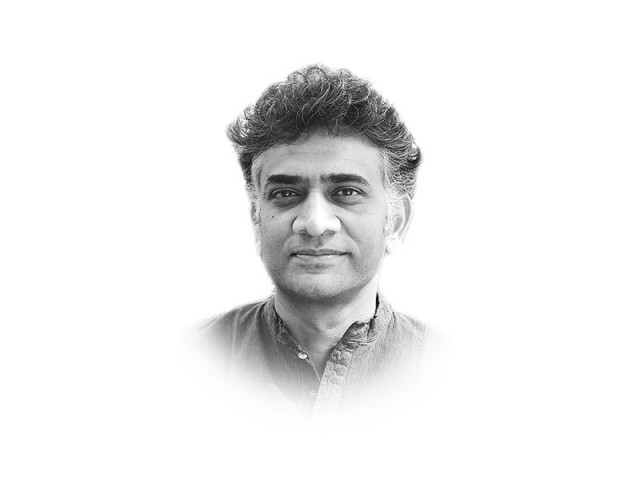Should the right to free speech be absolute?
For journalists, who are in the frontline of the free speech debate, its not easy to see the issue in black and white

The writer is the editor and translator of Why I write: Essays by Saadat Hasan Manto, published by Westland, 2014. His book, India, Low Trust Society, will be published by Random House aakar.patel@tribune.com.pk
Writing in Business Standard about the attack on the French weekly Charlie Hebdo, T N Ninan wrote that: “Many societies, especially those who are a part of the Western Enlightenment, admit to few if any limits on the right to free speech — including the right to offend. Free speech was included in the ‘Declaration on the Rights of Man’ during the French Revolution as ‘one of the most precious’ rights of man.”
However, he added, “In the broad tradition of Sarva Dharm Samabhav (equality of all religions), it is pretty much inconceivable that any Indian publication would publish a cartoon [of Prophet Mohammed (peace be upon him)] in the full knowledge that it would cause offence to millions.” Yes, and even if an adventurous editor were to be so inclined, he would probably desist because of the trouble it would bring. Not just the violence and the threats but also the legal problems.
India has a troubled tryst with free speech and even the great Jawaharlal Nehru was unsure of how to approach this fundamental freedom. Article 19 (1) (a) of the Indian Constitution guaranteed free speech to Indians on January 26, 1950. Fifteen months later, Nehru backed down from this guarantee and imposed restrictions. Half a dozen laws restrict freedom of speech in India. Many of these are strange. Ninan adds in his piece that "India has a more nuanced approach; the right to free speech is a fundamental but not an absolute right; the Constitution limits it on grounds of ‘public order’ as well as ‘decency and morality’, all of which are elastic terms. Why, even writing that could affect relations with friendly countries is debarred. Apart from the issue of principle, there is the practical difficulty that there is no approved list of friendly and unfriendly countries."
There are specific laws we have on provoking religious violence, promoting enmity, insulting a religion and wounding religious feelings. But these laws aren’t new. Our laws curbing free speech were drafted in 1837. When he was only 33, Thomas Macaulay began producing the Indian Penal Code. It has continued in more or less the same form for 175 years. It shows what a remarkably unchanging culture we are despite living amid the trappings of modernity. The code, a colonial set of laws, remains in force in free India. This is because an Englishman accurately assessed us, and predicted our behaviour and our reaction to external stimulus. This makes Macaulay a very great man. He could tell with confidence in 1837 how many of us would go bestial in 1984 and 1993 and 2002. The Indian Constitution made great and universal promises, but then succumbed to the reality of India’s communal violence.
For journalists, who are in the frontline of the free speech debate, it is not easy to see the issue in black and white. I did not know that Charlie Hebdo had fired one of its journalists for anti-Semitism. I was surprised to know this had happened, given how enthusiastic the magazine was about attacking Islam.
The Daily Telegraph reported in 2009 that "Maurice Sinet, 80, who works under the pen name Sine, faces charges of ‘inciting racial hatred’ for a column he wrote last July in the satirical weekly Charlie Hebdo. The piece sparked a summer slanging match among the Parisian intelligentsia and ended in his dismissal from the magazine.
““L'affaire Sine" followed the engagement of Mr Sarkozy, 22, to Jessica Sebaoun-Darty, the Jewish heiress of an electronic goods chain. Commenting on an unfounded rumour that the president's son planned to convert to Judaism, Sine quipped: “He'll go a long way in life, that little lad.”
“A high-profile political commentator slammed the column as linking prejudice about Jews and social success. Charlie Hebdo's editor, Philippe Val, asked Sinet to apologise but he refused, exclaiming: “I'd rather cut my testicles off.”
“Mr Val's decision to fire Sine was backed by a group of eminent intellectuals, including the philosopher Bernard-Henry Levy, but parts of the libertarian Left defended him, citing the right to free speech."
It might seem as a clear case of hypocrisy, but, like all of us, Charlie Hebdo also had its doubts about free speech.
Published in The Express Tribune, January 11th, 2015.
Like Opinion & Editorial on Facebook, follow @ETOpEd on Twitter to receive all updates on all our daily pieces.



















COMMENTS
Comments are moderated and generally will be posted if they are on-topic and not abusive.
For more information, please see our Comments FAQ